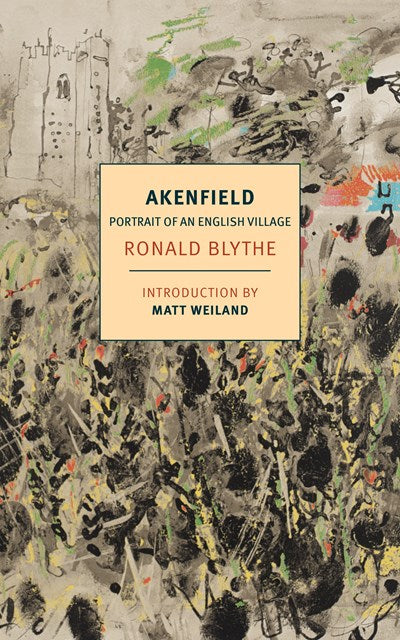“His style was informed but conversational, erudite but never pedantic; he displayed none of the typical autodidact’s flaunting of his own hard-won knowledge.” —Clay Risen, The New York Times
"Ronald Blythe conducted the fifty-odd oral histories that make up his portrait of a (renamed) village in rural Suffolk with an exceptionally sharp eye for poignant situations and an equally fine ear for telling phrases. Every one of his interviews is a compact drama of identity—often riveting in itself, and always contributing to an idea of community that is at once coherent and varied." —Andrew Motion, The New York Review of Books
“Ronald Blythe lovingly draws apart the curtains of legend and landscape, revealing the inner, almost clandestine, spirit of the village behind. His book consists of a series of direct-speech monologues, delivered by forty-nine Suffolk residents, and interpretatively linked by the author. The effect is one of astonishing immediacy: it is as if those country people have looked up for a moment from their plow, lawnmower or kitchen sink, and are talking directly (and disturbingly frankly) to the reader. This is a brilliant and extraordinary book which raises disquieting second thoughts when the poetry has faded—as Mr. Blythe says, it is like a ‘strange journey through a familiar land.’” —Jan Morris, The New York Times Book Review
“A hundred years from now, anyone wanting to know how things were on the land will turn more profitably to Akenfield than to a sheaf of anaemically professional social surveys.”
—The Guardian
“For all its quiet and subtlety, Akenfield documents the disappearance of an entire mode of civilization. Like the artist he claims foremost to be, he animates the countryside, gives it color and depth. He turns 'quiet streets of old houses' into 'huge clear spaces,' and finds the ordered, evolving poetry in everyday speech and feelings.”—John Lingan, The Baffler
“You will never be the same after reading this exquisite and revelatory book. You are caught by this chronicle, by the words of non-celebrated villagers. You do not hear them talking; you hear them feeling. It is life sung out by the celebrants of themselves.”
—Studs Terkel
“...one of the really great books of the decade.” —Harrison Salisbury
“Here is a delectable book; a book to linger over and cherish, every page of which compels fresh thought and lets the reader actively participate in an attempt to understand and evaluate the life of one East Anglian village in the nineteen sixties.” —Edward Candy, The Times Saturday Review
“A superb documentation of the changes which have revolutionized modern England.” —The Atlantic
“Exquisite.” —John Updike
“Still the best portrait of modern rural life in England, subtle and compassionate.” —Roger Deakin, BBC Wildlife magazine
“The community of Akenfield remains wild, mysterious, glorious, petty, and finally beyond reach...What makes the villagers what they are? What is their future? The life-likeness of the book leaves the questions far beyond the range of facile answers.” —The New Republic

